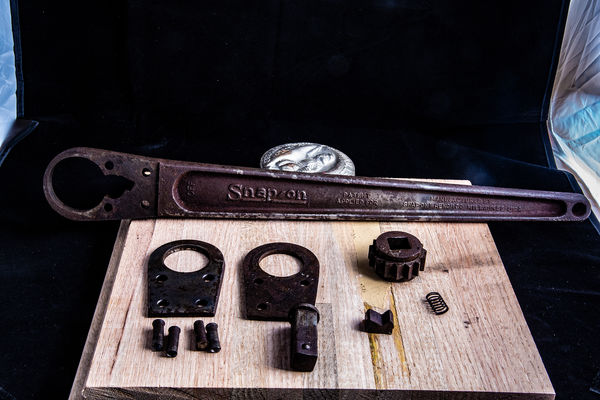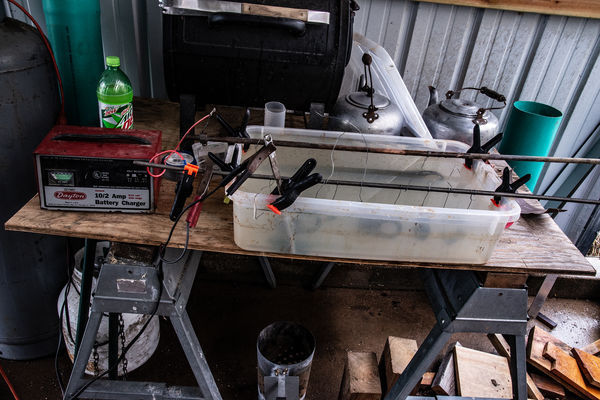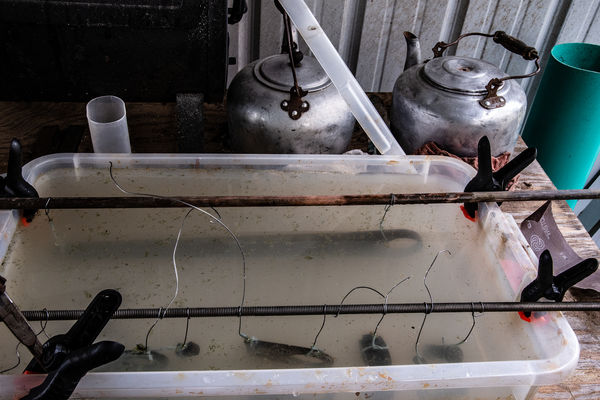Snap-on ratchet restoration
May 17, 2020 07:38:51 #
Part 1: Ready for electrolysis to remove Rust.
Hopefully I will remember to continue to photograph each step.
Hopefully I will remember to continue to photograph each step.
May 17, 2020 07:56:10 #
Manglesphoto wrote:
Part 1: Ready for electrolysis to remove Rust.
Hopefully I will remember to continue to photograph each step.
Hopefully I will remember to continue to photograph each step.
That looks like a good project. Any idea how old that is?
Keep taking pictures, and keep posting them. I always take pictures when I disassemble something for the first time.
May 17, 2020 07:59:00 #
May 17, 2020 07:59:05 #
Wow, that looks like an old one. I'll be interested in seeing this project progress.
--Bob
--Bob
Manglesphoto wrote:
Part 1: Ready for electrolysis to remove Rust.
Hopefully I will remember to continue to photograph each step.
Hopefully I will remember to continue to photograph each step.
May 17, 2020 10:47:47 #
jerryc41 wrote:
That looks like a good project. Any idea how old that is?
Keep taking pictures, and keep posting them. I always take pictures when I disassemble something for the first time.
Keep taking pictures, and keep posting them. I always take pictures when I disassemble something for the first time.
No real clue to the age, but taking a guess I would say 1920's.
Well are research I found Snap-On Tool went in business in 1920, so it may be a little newer.
I never take pictures before disassembly , so far there were only two things I took apart that I couldn't put back together , a clock and a 1949 Ford overdrive assembly but I thing the hammer had something to do with that.


May 17, 2020 10:49:23 #
rmalarz wrote:
Wow, that looks like an old one. I'll be interested in seeing this project progress.
--Bob
--Bob
Thank you for commenting Bob.
Step two is coming shortly.
May 17, 2020 10:58:01 #
Part: 2
Electrolysis: Getting the rust off.
This is better and cheaper than using Vinegar, you don't have to wonder if you have rinsed the parts enough to remove the acid, and it don't STINK!!!
When I get done with this I may set up a tank in the shop.
Electrolysis: Getting the rust off.
This is better and cheaper than using Vinegar, you don't have to wonder if you have rinsed the parts enough to remove the acid, and it don't STINK!!!
When I get done with this I may set up a tank in the shop.
May 17, 2020 11:03:38 #
Interesting. The best I can do is with Photoshop and that works without odor too.
May 17, 2020 11:14:32 #
May 17, 2020 11:25:03 #
TriX wrote:
What electrode material did you use for the anode and what solution?
Steel and washing soda, it can be done with plain water but this way is a bit faster.
May 17, 2020 11:25:46 #
Fotoartist wrote:
Interesting. The best I can do is with Photoshop and that works without odor too.
Lol, but it don't make the tool usable


May 17, 2020 13:17:18 #
Manglesphoto wrote:
Steel and washing soda, it can be done with plain water but this way is a bit faster.
Thank you - very useful technique. I make it a point not to let my tools get rusty, but I have a couple of very old Craftsman large sockets that got hung in a tree (pulling a line over a limb) for several years until they finally fell out. They bother me every time I look at them, and I’ll try your method this weekend.
May 17, 2020 13:46:25 #
The only thing I know about electricity is flip a switch and the light comes on and that's it.
I have some tools that my Dad gave me about sixty years ago, seems like last week. I stored them in my shed and they've rusted so they are nearly unusable. Vinegar doesn't touch them. I would like to try this. Would you tell me step by step in VERY lay men's language how to set it up?
I have some tools that my Dad gave me about sixty years ago, seems like last week. I stored them in my shed and they've rusted so they are nearly unusable. Vinegar doesn't touch them. I would like to try this. Would you tell me step by step in VERY lay men's language how to set it up?
May 17, 2020 13:52:40 #
Don’t know if you have a bench grinder, but I’ve found the best way for me to get rid of rusty surfaces on steel is to use a wire wheel and then a buffer wheel on a bench grinder.
If they’re cleaned and polished it reduces any further damage. If the tool is a ratchet then depending on the amount of rust the mechanism will need to be taken apart, cleaned and greased too.
If they’re cleaned and polished it reduces any further damage. If the tool is a ratchet then depending on the amount of rust the mechanism will need to be taken apart, cleaned and greased too.
May 17, 2020 15:52:25 #
TriX wrote:
Thank you - very useful technique. I make it a point not to let my tools get rusty, but I have a couple of very old Craftsman large sockets that got hung in a tree (pulling a line over a limb) for several years until they finally fell out. They bother me every time I look at them, and I’ll try your method this weekend.
White Vinegar will work too
I didn't have a choice about the care of the tool, it was like that when I got it.
The first step ( which I didn't photograph was disassembling the tool, the plates were riveted on and I had to drill the very thin head out, I used the SWAG method to find the proper size center drill and the proper depth so as not to destroy the plates.
The next step will be the removal of what little chrome or nickel plating there is. Then re-plating, probably Nickel plating.
If you want to reply, then register here. Registration is free and your account is created instantly, so you can post right away.









